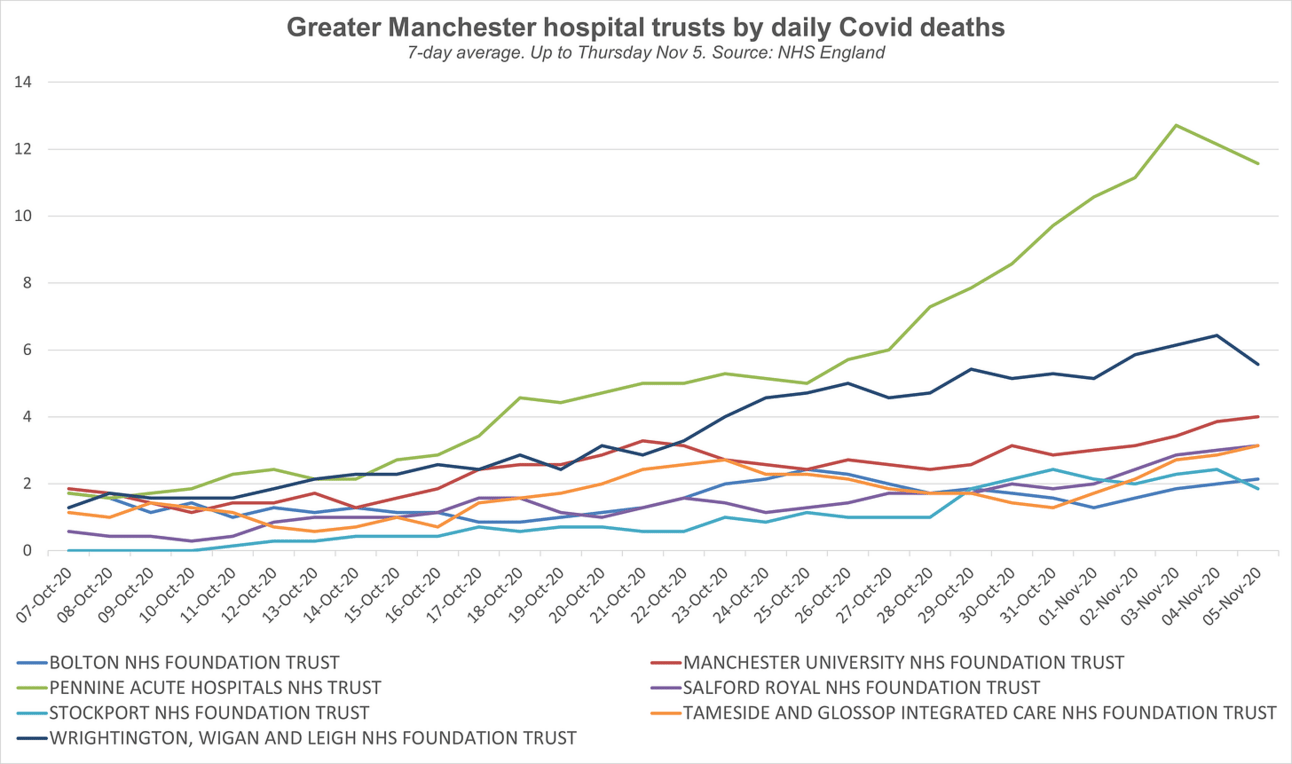Good afternoon and welcome to our Monday briefing. This newsletter is a bit delayed because we wanted to give the Pennine Acute hospital trust an opportunity to comment on the situation there.
Covid deaths have continued to increase in Greater Manchester, rising to 32 per day, which helps to explain why hospitals are now suspending non-urgent work across the system (see more below).
A disproportionate number of those deaths - around 12 per day - are happening at the Pennine Acute hospitals, which include Oldham, Rochdale, Bury and North Manchester. The data indicates the trust is having a problem with “probable healthcare-associated infections” - i.e: a hospital outbreak, or outbreaks. There’s more on that in the second half of the newsletter, which focuses on Covid.
If you missed our story yesterday, it was about Maurice Wilson, the man who took on Everest in the early 1930s - alone. It’s well worth a read.
News briefing
Hospitals | All Greater Manchester’s hospitals have paused non-urgent surgery and appointments in response to pressures on the system from Covid-19 patients. The news was first reported in the MEN on Saturday and has been confirmed to us this morning. Cancer and other urgent care, including cardiac services, vascular surgery and transplantation will continue. A spokesperson for Greater Manchester Health and Social Care Partnership, which includes all NHS hospitals in the city region, released this statement:
Our hospitals are now treating more Covid patients than at the peak of the first wave and as a result of this, a number of non-urgent operations will be temporarily delayed – we are contacting the affected patients. Urgent and emergency care, including cancer treatment and operations will continue as normal and it’s important that anyone with concerns continues to come forward for help and treatment.
Protest | Anti-lockdown protesters holding signs with slogans like “Lock up Chris Whitty” and “Covid-1984” gathered in central Manchester yesterday, before being dispersed by police. Chief Constable Ian Hopkins condemned what he called “utterly ridiculous behaviour from the organisers and the protesters, deliberately breaking the law and putting our communities at risk”. Police handed out 24 Fixed Penalty Notices of £200 each and four participants were arrested on suspicion of public order offences.
Rashford | The government gave in to pressure from Man United striker Marcus Rashford this weekend and released extra funding for families struggling to buy food. “A winter grant scheme, to be run by councils, will provide support with food and bills, and a holiday food and activities programme is to be expanded,” the BBC reported. This isn’t the extension of Free School Meals that Rashford has been demanding, but he welcomed the move. Councils will receive £170 million, of which 80% will be earmarked for help with food and bills.
Piccadilly wall | The free-standing part of the notorious Piccadilly Gardens wall will start to be demolished next week. Councillor Pat Karney, the council’s city centre spokesperson, said: “This is the news that everybody in Manchester has been waiting for – part of the wall is coming down. I’m going to mark it on my calendar. This is only the first part of what will be much bigger plans to make Piccadilly Gardens the vibrant and inviting space at the heart of the city which it should be.”
Things to do this week
Theatre | HOME has announced that all its theatre shows during the period of the November lockdown will be live-streamed, with tickets available on a pay-what-you-decide basis. On Thursday night you can watch a dance-based performance called The End - a “poignant, sad and funny account of the ongoing ecological crisis”, which will be repeated at 7.30 pm on Friday and Saturday nights too. Book here.

Bertrand Lesca and Nasi Voutsas, who perform The End
Music | Local singer Jake Fletcher has been performing live streams from his attic every Saturday night since March, which have attracted a small but loyal audience on Facebook. A Mill reader says the shows have been an important part of helping her through the isolation of the pandemic.
Art | Manchester Art Gallery is hosting a panel discussion called “Uncertain Futures: Women over 50 and work” on Wednesday. It will focus on inequalities in the workplace, and links to a show the gallery is planning on this topic. The event is free, but you have to book here.
Walks | If you need some inspiration for your daily exercise, Manchester Wire has a list of nearby forests to explore this winter, including Worsley Woods in Salford and Delamere Forest in Cheshire.
Latest Covid data
Deaths | Last week we reported that 21 patients were dying each day in Greater Manchester’s hospitals after testing positive for Covid. That has risen quite significantly to 32 per day in the week ending Thursday. It means the rate of hospital deaths is now more than half the rate we saw in the peak week in April, when we had 58 deaths per day on average. More analysis in the section below.
Patients | There were 126 Covid patients in critical care beds in Greater Manchester last Tuesday, up 26 on last week (a 26% rise). That means around half of the normal critical care capacity is being used by Covid patients, and 84% is being used in total, although officials point out that capacity is being increased. Outside of critical wards, there were 1049 Covid patients at the start of last week, up 26% on the week before. We will start focusing on this number, rather than admissions and in-patient diagnoses, because it is a bit clearer, and it’s better at capturing the actual pressure on services.
Cases | Infection rates are still extremely high (ranging from about 780 in Oldham to around 400 in Trafford). Oldham, Wigan, Salford, Rochdale, Bury and Bolton all make the top 10 English local authorities with the highest infection rates. That’s the bad news. The better news is that rates are currently falling in six of the ten boroughs. The @UKCovid19Stats Twitter account calculates rates every day and puts them in a league table.
Deaths at Pennine Acute
What’s driving the increase in Greater Manchester’s Covid deaths? In large part, it’s the Pennine Acute Trust, which includes North Manchester General, Fairfield General in Bury, The Royal Oldham and Rochdale Infirmary. This one trust is now seeing almost 12 Covid deaths per day, the highest in the country. Over the past month it has had 197 of GM’s 600 Covid deaths, and last Tuesday it saw 17 deaths in one day.
The graph below shows GM’s main hospital trusts and how many Covid patients are dying per day over the past month. You can see that a month ago they were all seeing fewer than two deaths per day and that most of them haven’t doubled in that period, whereas Pennine Acute has grown by a factor of about six, and deaths at Wrightington, Wigan and Leigh Foundation Trust have roughly trebled.

Why are deaths at Pennine Acute so high? Clearly, it covers areas of GM that have had higher rates of the virus, in particular Oldham. But it looks like the significant uptick in mortality isn’t just attributable to the virus spreading in communities. We asked the health economist Daniel Howdon from Leeds University to run some numbers on the trust, and they show that almost a third of its new Covid patients in the last week are what experts call “probable healthcare-associated infections”. Ie, the data suggests a third of patients were infected within the hospital, not in the community.
"Hospital outbreaks can be associated with higher mortality," Howdon says, owing to the fact the virus is spreading among already vulnerable people. "We've seen examples of death rates of up to one in three people infected in hospital outbreaks." We contacted the trust (which has been incorporated into a larger group called Northern Care Alliance) this morning, and have not heard back.
Staff under pressure
We tend to focus on the latest data in this briefing, but a couple of readers who work in healthcare have recently been in touch urging us to emphasise the human side of the hospitals story - most notably the growing pressure on staff.
“The NHS is made of people,” says one reader who works in hospital management but has a clinical background. She points out that staff being off work with the illness or self-isolating has sometimes resulted in some wards being less than half-staffed. She rightly points out that an outbreak on a ward affects both patients and staff.
Another reader, a hospital doctor, says the situation now is very different from what staff were experiencing in the Spring when hospitals emptied to prepare for the influx of patients. “Now they are as full as they usually are of the normal seasonal complaints and trauma, but in addition, we are having a steady stream of Covid positive patients,” she says. These patients have to be kept separate from non-Covid patients, requiring staff to use side rooms or designated wards, which causes delays.
Two doctors we have spoken to say there should be less focus in the media on the “capacity” of hospitals, and more on the consequences of creating space for the influx of Covid patients. Yes, hospitals can usually find beds for people when they arrive, but creating surge capacity requires cancelling elective procedures again.
If you work in the healthcare system and would like to feed in your experiences in confidence, please reply to this newsletter or email [email protected].
We are entirely funded by our members. If you enjoy reading our newsletters and want to help The Mill to grow, please consider becoming a member for £7 per month. Members get two or three extra stories every week and take part in our community discussion threads.




